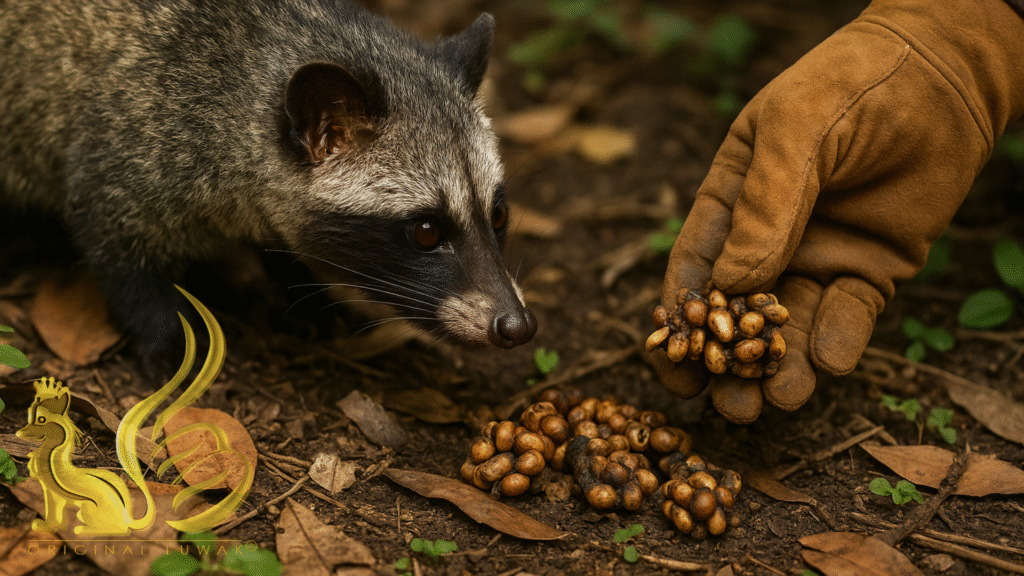Ever Wondered How Civet Coffee Is Made? Here’s the Full Journey
You’re sipping a smooth, low-acid coffee with hints of chocolate and earthiness. It’s exotic. Expensive. Almost mysterious. Then someone tells you it came from an animal’s poop.
Sounds weird? Welcome to the world of Kopi Luwak—one of the world’s most unique (and controversial) coffees. You’ve heard about it. Maybe even thought of trying it. But before you take a sip, you want to know one thing:
How is Kopi Luwak actually produced?
Let’s walk through it step-by-step—straight from the jungle to your cup.
Step 1: The Civet Picks the Cherries (Yes, Really)
The process starts in the rainforests of Indonesia, where the Asian palm civet roams wild. Think of it as a coffee sommelier in animal form.
Civets sniff out the ripest coffee cherries—sweet, red, and packed with flavor. They ignore the green or overripe ones. This natural selection process is what makes the beans special.
Why does it matter?
Because the civet’s choice ensures only high-quality cherries are used—something machines or mass-farming can’t replicate.
Step 2: Natural Fermentation in the Civet’s Gut
Once the civet swallows the cherries, the real magic begins.
Inside its digestive tract:
- Fermentation occurs naturally.
- Digestive enzymes break down the cherry pulp.
- The beans undergo chemical changes that soften bitterness and reduce acidity.
Think of it like nature’s own coffee processor. No factory. Just biology.
This step gives Kopi Luwak its signature flavor—smooth, earthy, and slightly sweet, often with chocolate or caramel notes.
Step 3: Harvesting the Droppings
Yes, the beans come out the other end. Literally.
Farmers and foragers collect the civet droppings early in the morning. They look for clusters of digested coffee beans on forest floors or in civet farms.
- Beans are still intact.
- Collected by hand (often using gloves).
- Wild-sourced beans are preferred for both flavor and ethics.
It may sound gross, but this is where rare coffee gets real.
Step 4: Washing and Drying the Beans
After collection, the beans go through a deep cleaning process:
- Soaked in water to loosen residue.
- Scrubbed to remove any impurities.
- Sun-dried on bamboo mats for days.
Only the best beans make it through. The rest are discarded.
This step ensures the beans are clean, safe, and ready for roasting—without losing that jungle essence.
Step 5: Roasting to Unlock the Flavor
Now the beans are roasted—usually to a medium or medium-dark level.
This activates the Maillard reaction, unlocking the complex flavor profile unique to Kopi Luwak:
- Low acidity
- Earthy aroma
- Smooth body
- Hints of chocolate, caramel, and nuts
It’s a sensory experience unlike any other coffee.
Step 6: Brewing the World’s Most Exotic Coffee
Brewing Kopi Luwak is no different than other gourmet coffees:
- Use a French press or pour-over for best results.
- Grind the beans fresh.
- Let the aroma guide your senses.
Each sip tells a story—from rainforest floor to refined cup.

But First, Let’s Talk Ethics
Not all Kopi Luwak is created equal.
Many farms cage civets, force-feed them cherries, and keep them in terrible conditions. This leads to:
- Animal stress and suffering
- Poor-quality beans (civets can’t choose cherries)
- Conservation risks from wildlife exploitation
Wild-sourced kopi luwak is the ethical option. It’s better for animals, better for taste, and better for your conscience.
A Coffee That Comes with a Choice
Now you know how Kopi Luwak is produced, step by step.
It’s a mix of wild nature, biology, tradition, and (yes) controversy. Every cup carries a decision—support the process that honors civets and their environment, or fuel the demand for caged cruelty.
So the next time you see that expensive bag of civet coffee, ask yourself:
Is it wild-sourced? Is it worth it?
Because sometimes, the story behind the cup matters just as much as what’s in it.

